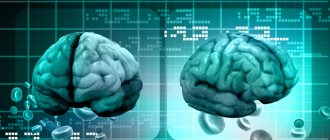A doctor knows how to distinguish a healthy person from a mentally ill person. But relatives do not always notice the “first signs”; they do not always understand in time that the norm has long ended and it is time to do something. The very fact that a loved one becomes insane is a great physical and moral test for all family members, and this sometimes makes it difficult to admit the obvious.
In this article we will talk about the most common symptoms of mental illness. Each of them separately does not always mean that a person is definitely sick. The diagnosis can only be made by a doctor. The task of loved ones is to notice in time that not everything is in order and contact a specialist.
What are mental illnesses?
Mental illnesses are those that lead to mild or severe changes in thinking and behavior, disconnect a person from reality, and prevent them from adequately interacting with others, performing work, and everyday activities.
Mental disorders are very diverse - there are more than 200 types. The most common are depression, dementia (dementia), bipolar disorders, anxiety disorders, and schizophrenia.
The causes of mental illness are also different: genetic predisposition, biochemical changes (improper functioning of certain substances) in the nervous system, illness and injury, severe emotional shock, chronic stress. Often several different factors work in combination, some making a person predisposed, and others acting as a trigger.
Flow options
In 50% of patients, latent schizophrenia begins to manifest itself in childhood, often in adolescence. But the clinical picture differs from the classical types of schizophrenic disorders. Symptoms affecting the psychopathic, neurotic and affective spheres are mainly observed. There is usually no aggression, motor rituals or gross obsessions. Autism and delusions are also not detected.
Childhood latent schizophrenia is characterized by dysontogenesis, in which the timing of the development of different aspects of the psyche is disrupted. Patients have fears that should no longer bother them at this age, for example, monsters under the bed. Also, such children are characterized by alienation - they do not become attached to relatives and peers.
Latent schizophrenia in adolescence is accompanied by depression and apathy. Cognitive functions are also affected. In particular, problems with thinking are noticed. As the disorder develops, signs such as causeless anxiety and fears appear that arise without connection with external or internal factors.
If therapy is not prescribed, the disease progresses, which leads to the formation of schizoid characteristics, including:
- emotional deficiency;
- inadequate reactions to external stimuli;
- loss of communication skills;
- formation of a disharmonious personality type;
- hysterical traits;
- psychasthenia, infantility, etc.
In 37% of patients, the disorder progresses to delayed exacerbations, which may not make themselves felt for decades.
Signs of the disease in women are usually observed later. In addition, they live longer with similar diagnoses.
Such patients are often called strange or eccentrics. This is due to the inadequacy of emotions. In simple terms, their reactions to certain events do not correspond to the event itself. They may become upset for no apparent reason, but not show any excitement in a stressful situation.
Patterns of behavior built by society and morality are of no interest to them, since their own rules and values have been formed in their brains.
What symptoms should you look out for?
One page on our website is not enough to describe all the symptoms of mental illness. You can learn more about them by reading other articles on our blog or in the section that lists the diseases treated by doctors at the Cordia Clinic. Here we list the main ones, those that you need to pay attention to first:
- Social isolation . A person ceases to be interested in those around him, he stops communicating and participating in common affairs.
- Decreased performance . Mentally ill people no longer cope normally with household chores and work. Children's performance at school sharply declines, and complaints from teachers are received more often.
- Thinking disorder . Problems arise with memory, concentration, and logic. A person does not understand the obvious, it is difficult for him to explain something to others, he cannot find the right words. In severe cases, speech turns into a meaningless set of words.
- Increased sensitivity to irritants . Patients can feel sounds, light, taste, touch more acutely, they avoid irritants that cause them discomfort.
- Apathy . You lose interest in anything at all, even in activities that previously brought you pleasure.
- Brad . A person talks about something that does not exist in reality. He greatly exaggerates or downplays his capabilities, believes that someone is watching him, pursuing him, trying to cause harm.
- Emotional problems . Frequent companions of mental illness are increased irritability, isolation, depression, anger, violent causeless joy and optimism, suspicion, and a feeling of internal tension.
- Unusual behavior . The person is clearly behaving inappropriately.
- Frequent and severe mood swings.
- Appetite and sleep disorders . Some patients become gluttonous, while others, on the contrary, do not eat anything. May cause insomnia or excessive sleepiness.
- Destructive thoughts and behavior . Very alarming bells are thoughts of suicide, the desire to harm yourself and others.
- Hallucinations . A person sees, hears and feels something that is not really there.
Patients often refuse to acknowledge the severity of their condition. They believe that everything is fine with them, but something “wrong” is happening to others. Any attempts to convince them of anything, reproaches and complaints lead nowhere and can only provoke a negative response. This symptom in psychiatry is called lack of criticism, and it clearly indicates a mental disorder.
Forms of schizophrenia and characteristic signs
There is still no uniform classification of the disease for all countries. But many psychiatrists use the classification of E. Kraepelin, who identified 3 forms:
- Catotonic - delusional and hallucinatory symptoms are combined with motor disorder;
- Hebephrenic (disorganized) – behavioral disorders manifest themselves in a rough form (foolishness). Emotions are flattened and inadequate, and thinking is torn;
- Simple (or juvenile) - occurs during puberty. This form is characterized by a progressive impoverishment of emotions and intellectual unproductivity. Apathy and isolation are growing.
Sometimes a mixed form occurs. That is, it combines the characteristics of all 3 forms. Later, another form was identified - paranoid. Delusional symptoms dominate, which is accompanied by various hallucinations (or pseudo-hallucinatory syndrome).
The more research was done, the more different forms were added:
- Circular;
- Neurosis-like;
- Hypochondriacal.
According to ICD-10, the following forms of schizophrenia are distinguished:
- Paranoid simple;
- Hebephrenic;
- Undifferentiated;
- Catatonic;
- Residual.
The following subtypes of schizophrenia are considered: post-schizophrenic depression, senile depression and various schizophrenias of unspecified origin.
There are also various forms of schizophrenia:
- Continuous flow:
- Malignant juvenile – simple, paranoid, catotonic or hebephrenic;
- Paranoid – delusional or hallucinatory symptoms;
- Paroxysmal-progressive – symptoms are close to paranoid. Perhaps the course is malignant or indolent;
- Atypical protracted;
- Febrile;
- Paronoid;
- Same type of attacks;
- Combines different types of attacks.
Against the background of schizophrenia, patients begin to drink alcohol, which aggravates the course of the disease. Alcohol addiction is rapidly developing. In this case, addiction is secondary. But there is a separate form of the disease - alcoholic schizophrenia. Mental abnormalities appear against the background of chronic intoxication. Broken neuronal circuits provoke a comorbid disorder that is difficult to treat.
In any form of schizophrenia, a reduction in energy potential is observed. Mental activity begins to cause difficulties, as does the perception of new information. Therefore, it is not always possible to maintain professionalism at the same level.
Common signs of schizophrenia in women:
- Speech is incoherent (broken), the meaning of the story is lost. Voice in the same key, regardless of the nature of the story (event, everyday story);
- Thinking – lack of focus and consistency of thought. Influxes of thoughts alternate with a feeling of “emptiness” in the head. Imagery of thinking disappears. This phenomenon was called the slippage (or blockage) of thoughts. When making a decision, duality (opposite) opinions arise. The patient cannot choose the correct option;
- Appearance – facial expressions are almost absent, mannerism is observed in behavior. Such patients outwardly look sloppy and unkempt. The clothing style is often flashy or ridiculous;
- Emotions – emotional deficiency or inadequacy. Emotional changes appear at the peak of the disease and constantly progress. Emotional coldness develops into paradox. A woman is indifferent to any sad event in the family. But at the same time, an inadequate negative emotional reaction arises to an ordinary statement addressed to oneself. Sometimes an emotional attachment to someone close to you (child, mother, husband) remains.
Another phenomenon characteristic of schizophrenia is drift. Increasing passivity is noted. That is, over time, active life becomes a “go with the flow” category. A woman becomes indifferent to her life and family, she does not feel the same energy and incentive to develop.
What to do if your loved one is mentally ill?
You need to prepare for the fact that your life can change greatly and learn how to behave correctly. A mentally ill person often becomes the center of attention for the entire family. Personal interests of household members fade into the background. We have to put up with the patient’s inappropriate behavior. You also need to prepare for the fact that the treatment may not work immediately. Sometimes the drugs prescribed initially do not help, and new ones have to be selected.
Yes, if a person has a mental illness, his relatives have a hard time. Some tips will help you withstand these stresses and maintain your own health:
- Control your emotions. Don't take what the patient says and does personally. Remember: he has no control over himself.
- Take breaks and find time to rest. You need to take turns sitting with the patient. If you don't have relatives who can help, hire a caregiver and have them come at least sometimes.
- If you feel emotionally damaged, see a psychologist or therapist. Don't wait for the problem to get worse.
- You must eat well and get enough sleep. Otherwise, you will not be able to cope with the load.
If you notice the symptoms described in this article in a loved one and think that they may be mentally ill, contact the specialists at the Cordia Clinic for help. Our experienced doctors will definitely try to help.
Diagnostics
Throughout, latent schizophrenia maintains a mild, mild course. This allows us to differentiate it from the sluggish form, which is characterized by attacks with intense symptoms, including delusions and hallucinations. However, it is quite difficult to distinguish latent schizophrenia from the initial stages of sluggish schizophrenia. We have to monitor the patient for a long time - from 3 months to 2 years.
Symptoms of the disorder may appear in childhood, but the diagnosis is not made until the child reaches adolescence, as the initial symptoms may disappear over time without any treatment. However, doctors say that the disease can return after 10 or even 25 years.
Diagnostics is carried out in several stages. First, the doctor needs to get acquainted with the complaints of the patient and his relatives; the medical history is studied, including relatives if there were people with mental disorders in the family. At the next stage, standard methods are assigned:
- general blood analysis;
- EEG;
- MRI;
- CT;
- thyroid-stimulating hormone test;
- analysis for cortisol levels, etc.
If necessary, the patient is examined by specialists of related specialties. The main task is to separate latent schizophrenia from borderline personality states.
Treatment
Treatment is carried out in two directions - medication and psychotherapy. With timely treatment, the disorder can be corrected quite successfully. Moreover, it is usually treated on an outpatient basis. Mild antipsychotics are prescribed in small dosages. They help reduce anxiety and normalize perception.
Psychotherapy is based on cognitive behavioral therapy, during which the patient acquires communication skills and control over his own emotions. The patient must understand that he is sick and how he looks from the outside during his inappropriate actions. In general, this type of treatment is aimed at:
- development of defense mechanisms;
- establishing family relationships;
- disease control training;
- correction of the general personality structure.
Sessions of group, individual and family therapy are practiced. Relatives will also have to learn to communicate in a new way with their sick loved one.










